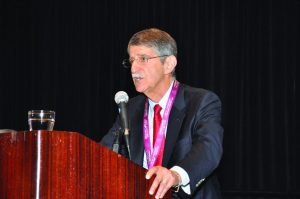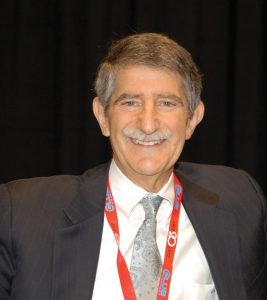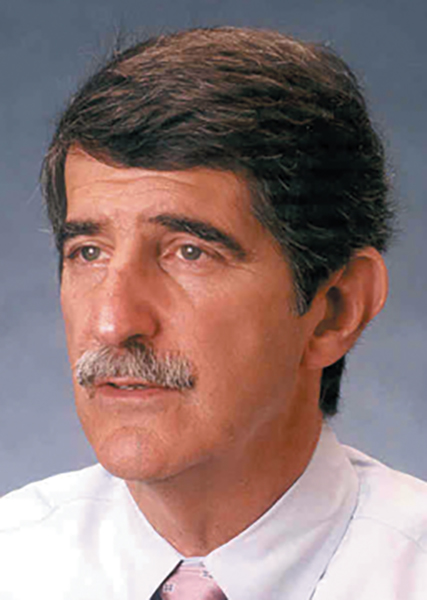*story by Larry Kaplan
Fabled First Amendment attorney John Weston, one of the adult industry’s leading defenders for nearly the entirety of its existence, died of cancer, September 11th, surrounded by his family, friends, and law partners.
Weston was a brilliant, dedicated warrior for free speech with a career spanning over 50 years. Weston devoted his professional life to fighting against censorship and excessive government regulation and ensuring adult businesses’ right to present and all Americans right to enjoy First Amendment-protected activities.
Weston’s law partner, Jerry Mooney, talks about his partner’s career and accomplishments.
“John Weston was one of the nation’s most distinguished First Amendment attorneys,” explains Mooney. “He spent five decades fighting for the important constitutional principle that speech should not be prohibited based upon its message. His lifelong battle against government censorship and government overreach helped establish the firm principle that the expression of ideas, no matter how distasteful, must be treated fairly. John argued seven cases before the United States Supreme Court, and scores of other appellate cases in state and federal courts nationwide, establishing much of the current case law regarding adult media. Through his efforts, he made the freedom of all Americans greater and more secure. He was a great friend and a wonderful human being.”
Between 1975 and 2001, Weston went to the U.S. Supreme Court seven times to present oral arguments. The cases were Young v. American Mini Theatres, Inc. (1976); Brockett v. Spokane Arcades, Inc. (1984); Fort Wayne Books, Inc. v. Indiana (1988); FW/PBS, Inc. v. City of Dallas (1990); Alexander v. United States (1993); City of Erie v. Pap’s A.M. (1999); and City of Los Angeles v. Alameda Books, Inc. (2001).

The first of these, Young v. American Mini Theatres, Inc. in 1976, involved two 1972 Detroit adult zoning ordinances, which prohibited adult businesses from locating within 1,000 feet of another adult business or 500 feet of a residential area. The regulations were struck down as unconstitutional by the Sixth Federal Circuit Court, but the City appealed, and the case landed in the Supreme Court. Unfortunately, despite Weston’s spirited oral argument, the Court reversed the Sixth Circuit and upheld the locational restrictions in a 5-4 decision.
In 1984, Weston went before the Supreme Court again in the case of Brockett v. Spokane Arcades, Inc. A 1982 Washington state statute declared any place “where lewd films are publicly exhibited” and any place of business “in which lewd publications constitute a principal part of the stock in trade,” as a regular course of business” to be a “moral nuisance.” Lewd was defined as synonymous with obscene, with both terms defined with reference to prurient interest, which, in turn, was defined as meaning “that which incites lasciviousness or lust.”
Weston was victorious in his third trip to the Supreme Court in 1988 for Fort Wayne Books, Inc. v. Indiana. The High Court agreed, in a unanimous decision, that an Indiana law permitting the pretrial seizure of material alleged to be obscene imposed an unlawful prior restraint. “In Fort Wayne Books,” explains Mooney, “a key part of the holding, is that pretrial seizures of adult materials under RICO laws was a facial violation of the First Amendment.”
 Weston’s final appearance before the Supreme Court was in 2001 for City of Los Angeles v. Alameda Books, Inc. The case dealt with a Los Angeles city zoning ordinance, which prohibited adult bookstores from being within 500 feet of sensitive uses, or within 1000 feet of another adult business. The ordinance relied on a six-year-old study that showed a higher crime rate in areas near adult stores.
Weston’s final appearance before the Supreme Court was in 2001 for City of Los Angeles v. Alameda Books, Inc. The case dealt with a Los Angeles city zoning ordinance, which prohibited adult bookstores from being within 500 feet of sensitive uses, or within 1000 feet of another adult business. The ordinance relied on a six-year-old study that showed a higher crime rate in areas near adult stores.
Two adult bookstores, Alameda Books and Highland Books, operating under one roof, sued the City on grounds that the ordinance violated their First Amendment rights. The District Court sided with the stores, ruling that the 1977 study didn’t document that multiple-use adult businesses were responsible for more or worse secondary effects than single establishments. The Court of Appeals upheld the District Court’s ruling, finding that the City failed to present credible evidence to justify the zoning.
“Alameda Books issued breakthrough new, industry-favorable guidelines for analyzing whether the City, in fact, could rely on a 1977 study to uphold the ordinance,” explains Mooney. “A four-justice plurality increased the burden on the prosecution by saying that cities could not rely on ‘shoddy evidence’ of ‘secondary effects,’ and established a three-part test whereby adult businesses could challenge the asserted ‘studies’ on which cities relied. The four dissenters would have found the zoning ordinance entirely unconstitutional without the need for remand. Justice Kennedy, whose concurring opinion has universally been held to be the ‘holding of the Court,’ established an industry-favorable new ‘proportionality’ test which required cities to prove that any adverse impact of an adult zoning law on expressive businesses was significantly outweighed by its impact in preventing real and proven adverse secondary effects.”
“John Weston was one of the nation’s most distinguished First Amendment attorneys. He spent five decades fighting for the important constitutional principle that speech should not be prohibited based upon its message. His lifelong battle against government censorship and government overreach helped establish the firm principle that the expression of ideas, no matter how distasteful, must be treated fairly. He was a great friend and a wonderful human being.” — Attorney Jerry Mooney
Al Bloom worked with Weston when he was president and owner of Caballero Video.
“John Weston represented our company for First Amendment matters for many years,” says Bloom. “He was my personal attorney, representing me when I was indicted in the MIPORN federal bloodbath in Florida. He also represented me in Federal indictments in Kentucky. John got me through both matters with no convictions in either case. I spent countless hours with John, either in person or on the phone and traveling to Florida or Kentucky.
“John always told me that I was probably his only client who read every document from the government and his office. We collaborated on many motions; he on the legal issues, with my input as a common man,” Bloom adds. “John was a man of strong conviction and character, and he always made me and my family feel safe and well protected. During the “golden age” of adult movie productions, John was not only a First Amendment scholar but also a giant among attorneys specializing in the First Amendment. He was a great man, and the adult industry has lost a true friend and advocate.”
CalExotics CEO Susan Colvin worked with Weston when she was Operations Director at CPLC, early in her career.
“I was so sorry to hear about John Weston,” says Colvin. “He was a great attorney. He was one of our attorneys at CPLC. John was hard working, had great strategies, and believed strongly in the First Amendment!”
Larry Kaplan is the Legal Correspondent for StorErotica Magazine and Exotic Dancer Magazine. Mr. Kaplan is a broker in the sale and purchase of adult retail stores and adult nightclubs and the Executive Director of the ACE of Michigan adult nightclub state trade association. Contact Larry Kaplan at 313-815-3311 or e-mail larry@kaplanstoresales.com.














You must be logged in to post a comment.